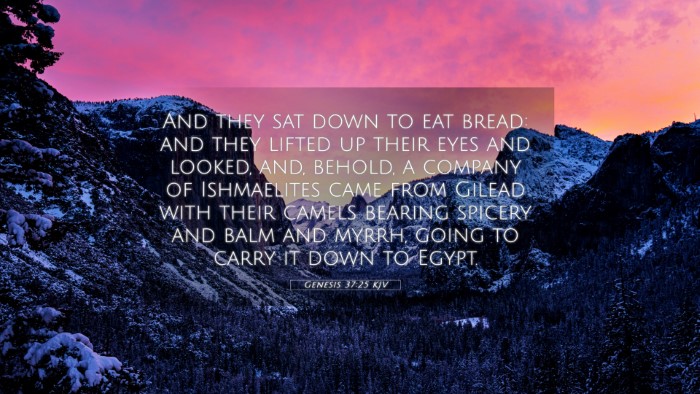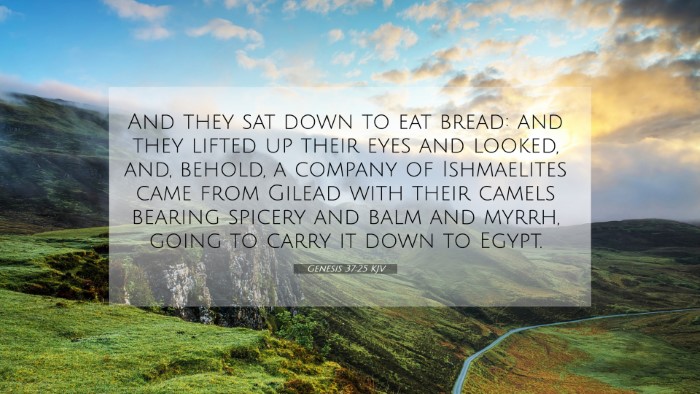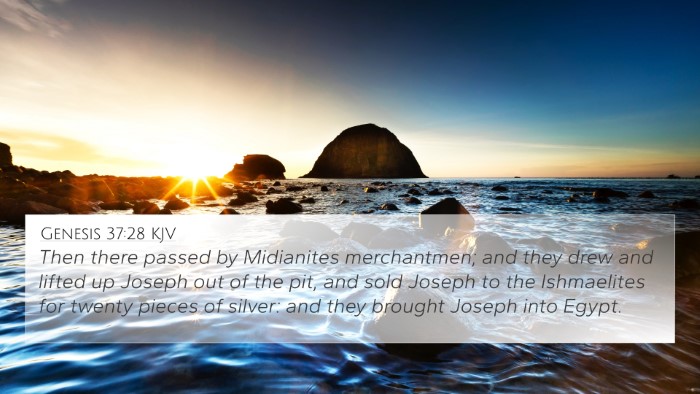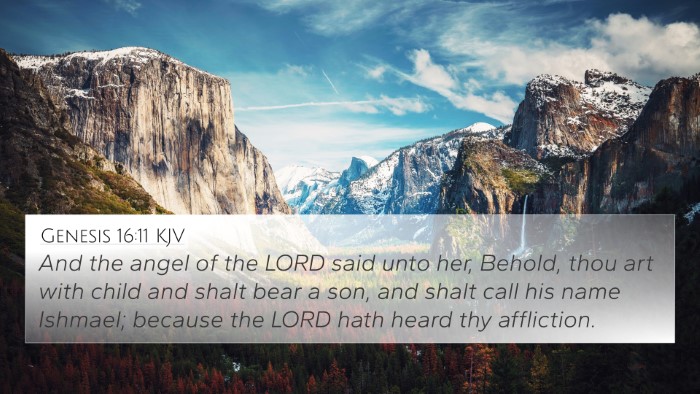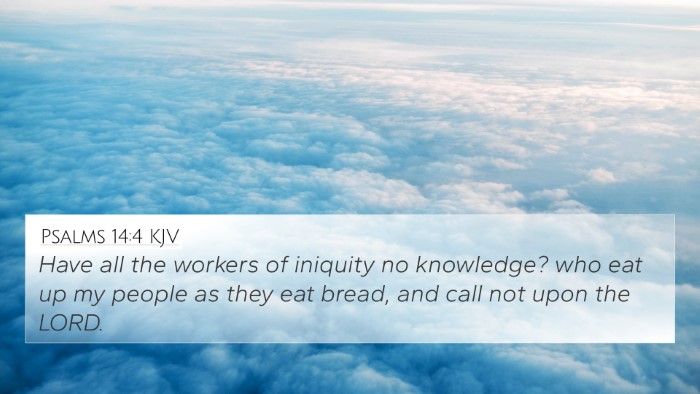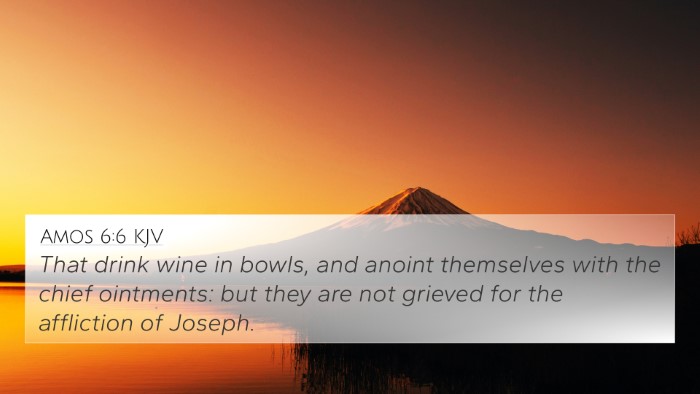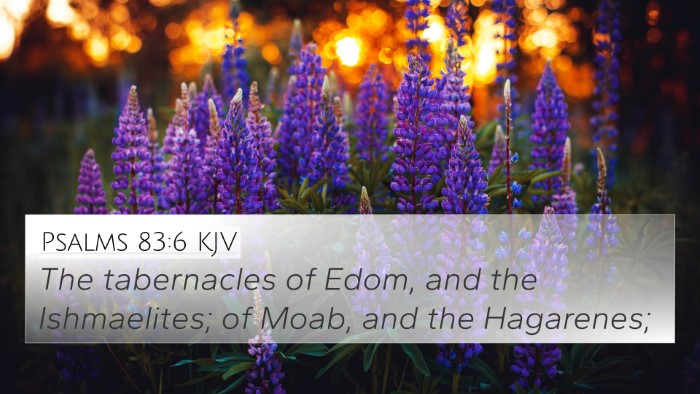Understanding Genesis 37:25
Genesis 37:25 narrates a pivotal moment in the story of Joseph, where his brothers, having thrown him into a pit, sit down to eat a meal, oblivious to the gravity of their actions. This verse opens up a rich tapestry of meanings and implications as explored through various commentaries.
Verse Context and Summary
This verse captures the emotional distance of Joseph's brothers as they partake in a meal while Joseph languishes in a pit. The stark contrast between their actions emphasizes themes of betrayal, indifference, and familial discord. The use of mundane activities like eating underscores the normalcy of their lives amidst the drama they are creating.
Commentary Insights
-
Matthew Henry:
Henry highlights the callousness of Joseph’s brothers. Despite the severe consequences of their betrayal, they manage to engage in everyday activities, illustrating the insensitivity that often accompanies profound wrongdoing. This invites readers to reflect on their own moral compass and the ease with which one can slip into a state of moral indifference.
-
Albert Barnes:
Barnes notes the significance of their actions in the broader narrative of Joseph's life and future. The act of sitting down to eat symbolizes a moment of normalcy for the brothers amidst their violent decision, indicating a psychological detachment from the gravity of their sin. This verse serves as a critical point in understanding the dynamics of sin and its repercussions on family relationships.
-
Adam Clarke:
Clarke offers a perspective on the moral implications of the brothers' behavior, discussing how their willingness to eat and carry on with their lives, shows a willful blindness to the pain they inflict upon Joseph. He underlines the notion that such brutality can often be mixed with ordinary life, allowing individuals to disengage from their moral responsibilities.
Thematic Connections
The themes found in Genesis 37:25 resonate throughout Scripture, presenting opportunities for cross-referencing and comparative analysis:
-
Indifference to Suffering:
This theme is prevalent in other Biblical narratives. For instance, the story of the Good Samaritan (Luke 10:25-37) contrasts the indifference of the priest and Levite with the compassion of the Samaritan.
-
Betrayal among Family:
The tensions depicted here connect closely with the narrative of David and Absalom (2 Samuel 15), where familial relationships are torn apart by betrayal and ambition.
-
The Theme of Reconciliation:
Joseph’s ultimate forgiveness of his brothers (Genesis 50:15-21) offers a powerful resolution to the thematics presented in 37:25.
-
Human Nature:
Paul discusses the nature of sin in Romans 7:14-25, exploring the conflict of adherence to moral norms while succumbing to base instincts.
-
Divine Providence:
The overarching narrative of Joseph’s life serves as an illustration of God's providence, seen in Romans 8:28, where all things work together for good for those who love Him.
Cross-References to Genesis 37:25
Examining Genesis 37:25 reveals various interconnections within the Biblical text:
- Genesis 37:12-14: The backstory of Joseph's brothers plotting against him.
- Genesis 37:26-28: The decision to sell Joseph into slavery showcases the consequences of their actions.
- Genesis 50:15-21: The eventual reconciliation highlights a transformation from betrayal to forgiveness.
- Luke 22:48: The betrayal of Jesus by Judas further echoes familial betrayal.
- Romans 8:28: All things work together for good, a comforting principle amidst Joseph's suffering.
- Mark 14:50: The abandonment of Jesus by His disciples illustrates human betrayal.
- Matthew 5:23-24: The emphasis on reconciling with one's brother before offered gifts to God resonates with the theme of family relationships.
Conclusion
Genesis 37:25 serves not only as a historical account but also as a profound illustration of human nature, familial discord, and the overarching theme of reconciliation found throughout Scripture. Through the lens of various commentaries, we gain insights into the complexity of sin and its implications, inviting deeper reflection on our interactions with one another as well as our relationship with God.
Further Study Recommendations
Engaging with the interconnectedness of Biblical texts expands our understanding. Recommended tools for cross-referencing include:
- Bible Concordance: A valuable tool for finding specific references and themes.
- Cross-reference Bible Study: A method for applying scripture to scripture, enhancing interpretation.
- Bible Reference Resources: Guides to assist in locating related verses.
- Comprehensive Bible Cross-reference Materials: For in-depth study of themes and connections across the scriptures.
Now, as readers pursue these connections and insights within their studies, they are encouraged to remember the profound lessons encapsulated in Genesis 37:25 and the broader narrative of Joseph's life.

